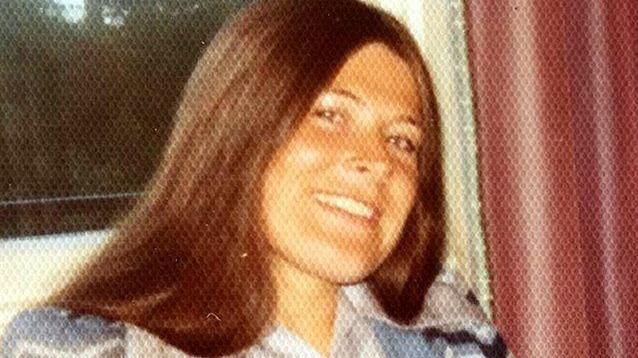Memorial for scientist murdered in 1978 unveiled

Brenda Page was murdered by her ex-husband
- Published
A memorial to a scientist murdered by her ex-husband in 1978 in Aberdeen has been unveiled by the university where she worked.
Dr Brenda Page, 32, was killed by Christopher Harrisson a year after the couple divorced.
The 82-year-old was finally convicted last year of the "inspirational" genetics expert's murder.
The University of Aberdeen dedicated a plaque to Dr Page next to its laboratories, and planted a chestnut tree in her memory.
A plaque was unveiled at the University of Aberdeen
Dr Page's nephew Chris Ling told BBC Scotland News: "I think this is a lovely tribute to my aunty Brenda who was obviously well liked and respected by her colleagues.
"I wish I could have been there to meet everyone but I would like to send my thanks to everyone involved."
Diane Massie and Diane Sandison worked with Dr Page at the University of Aberdeen’s genetics department.
They said the memorial was a fitting tribute.
Diane Massie said Brenda Page was a wonderful woman
Mrs Massie, who worked as a technician, said: “Brenda was very patient and took the time with you if you had a problem.
"She was just a wonderful woman. She had a great work ethic and it was a joy to be working underneath her.”
Of the murder, she said: "You couldn’t believe it. We were just really shocked. We cried when we heard.”
And of Harrisson’s conviction, she added: "It took so long, it was a shame it took so long, because he’s had his life, but it is justice now, thankfully."
Diane Sandison said the memorial was a good idea
Mrs Sandison, who was the secretary for the genetics department, said: “Brenda was a lovely person.
"She was gentle, caring, kind. Just a very nice person. Always smiling.
“That she’s being remembered in this way – it’s very good.”
- Published22 January
- Published18 January
- Published9 March 2023
The body of Dr Page was found on a blood-stained bed in her home on 14 July 1978.
Harrisson, who was then a research scientist, was immediately a suspect. He was apprehended in the hours after the murder and interviewed, and a report was submitted to prosecutors.
The murder dominated news headlines, as police continued to seek key witnesses or a vital piece of evidence.
However there was no breakthrough. It was decided there was insufficient evidence to take him to court, and Dr Page's death became a cold case.
Then, 37 years after the killing, police were instructed to reinvestigate in 2015.
The chestnut tree honours Dr Page's memory
Harrisson was brought in for questioning on 27 March 2020 and maintained he had nothing to do with his ex-wife's death.
However, more than four decades after her death, he was charged with murder.
Semen found on a duvet in Dr Page's flat, in Aberdeen's Allan Street, matched her former husband's DNA profile.
It was said by forensic expert to be 590 million times more likely to be from him than another man.
In March last year Harrisson was found guilty of murder after a 10-day trial.
He was jailed for life, and ordered to serve at least 20 years before he can apply for parole.